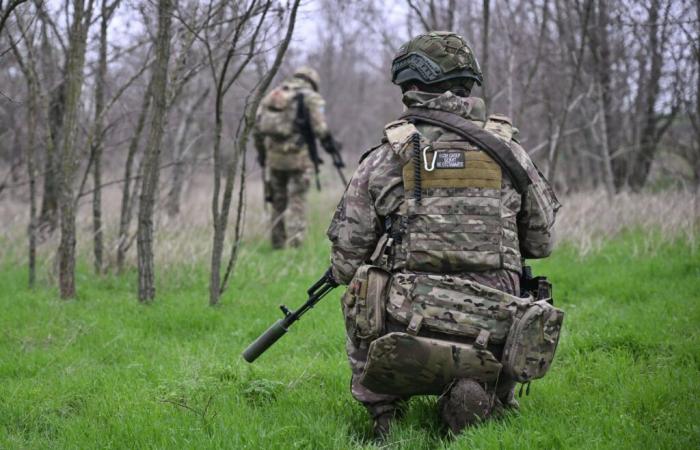The Russian economy is doped for the public expenditure for defense and the army. Expenditure that certainly generates growth but also inflation. Peace returned, alarm clock may be brutal.
This year, Dimitri, a modest hawker in Kostino, on the banks of Ienisseï, which cuts Siberia in two, decided to organize the ceremonies of Orthodox Passover at home. She fell this year on April 20, the same day as the Catholic, and he heard on the first TV channel, that at that date, Donald Trump, ” our president’s friend Promised to end the war. To do this, it needs to buy a quantity of eggs, find paintings of all colors to paint them, all in addition to all the other essential ingredients. Eggs? Their price went from 130-150 rubles in the dozen (1.3 to 1.5 euros) to 200 rubles, but will they not add to the high demand? Do he need to order them in advance? Of course his salary last year climbed 10%, which is the official inflation rate, but it knows, it is only an average statistics.
Also read: Ukraine. The great challenge of demobilized soldiers
Is inflation in Russia bearable?
In order to contain this inflationary thrust, which fits well above the objective of the Central Bank of Russia (BCR) of 4 %, its governor Ms. Naboioullina, increased the rate of discount at 21 % and maintained it at this level, while many representatives of the industrial sector, strangled by these rates, pleaded with force in the Kremlin for its decrease. Because banking rates are 30%. No small business can borrow from such rates!
In any emerging country, such an inflation rate makes it difficult to provide the service of its external debt, since its currency depreciates. However, the level of Russian public debt seems very low with regard to that of the majority of European countries or Japan, it is only around 17-20% of GDP. In addition, Russia benefits from a large mattress of reserves, which, so almost half (235 billion euros) have been frozen and not entered, are still substantial.
For the moment, this situation seems bearable. But Dimitri’s dilemma remains whole. It is that of millions of Russians, who do not live in major cities, or who do not work in the milk cows of the system, armed forces, police maintenance, Silovikisenergy sector or armaments industries.
The military-industrial complex has artificially swollen by war?
It is the phenomenal increase in expenses, linked to the war effort – they have tripled in less than four years – which explains the good health of the Russian economy: they represent 6.8% of GDP and 40% of budgetary spending, and explain 40% of Russian growth.
If we add security expenditure, this reaches 8.7% of GDP. The “steel eaters” of the time of the Soviet regime have regained service and did not care for butter or eggs. Nearly a million Russians have joined the defense industries where they benefit from beautiful wages, may have in mind this word from the French moralist Chamfort: “The war nourishes his man, if he does not kill him ». Reality in Russia has become quite different, because the death of a fighter provides his family with higher income than those he would have earned throughout his life as a work.
Read also: Reconstruction of Ukraine: Western financial assistance in the face of the black hole in corruption
For the Russians, who live in distant regions, as Dimitri, engaging in the war reports Gros: on average they receive 2,300 euros per month by fighting on the front line, while Dimitri’s monthly income only reach 700 to 800 euros. When a soldier dies in Ukraine, his relatives receive the ” coffin money “,”, Which can amount to 150,000 euros, astronomical sum compared to the means of number of committed. This sudden wealth offers economic boom to unhealthy regions of Russia. But if some evoke the emergence of a new middle class, it is likely that it is only short -lived, because peace will intervene one day or the other, and then the premiums will disappear, wages will stagnate if they fall, the savings will have been consumed by inflation. This enrichment will be able to collapse as quickly as it has arrived. In the meantime, the windfall has not escaped the most cynical: the Korean economic daily Mail Business Newspaper noted an explosion of 74 % of the prices of coffins in Russia since the start of the conflict.
The end of the war will be able to lead to a recession.
All this explains that the growth of the economy was stronger in 2024 (4.1%) than it was in 2023 (3.6%), yet a “good” year. We should move towards a limited growth of 1.5 % to 2 % in 2025, because the expenses related to the war have reached their ceiling. If peace was to arise at the beginning of the summer of 2025, the landing of the Russian economy, doped by many swollen expenses, may not land smoothly. It will have to convert once again, long and expensive process.
Before summer, Moscow will have to make difficult decisions: increase or decrease military spending, limit growth, boost inflation or lessen the standard of living of the Russians. For the moment, Dimitri will be able to celebrate Pashka with pomp, but what will he be tomorrow? The conflict with Ukraine risks having lasting effects on the finances of citizens and on the inequalities between rich and poor. According to the Russian -speaking investigation media The Insider, The disparities have already dug since 2022 and this may go from bad to worse. The middle and popular classes are already the great losers of this war. The wealthiest, they are still enriched. “” A being that gets used to everything, that’s it, I think, the best definition we can give man “Wrote Dostoyevski,” recalls Dimitri.






